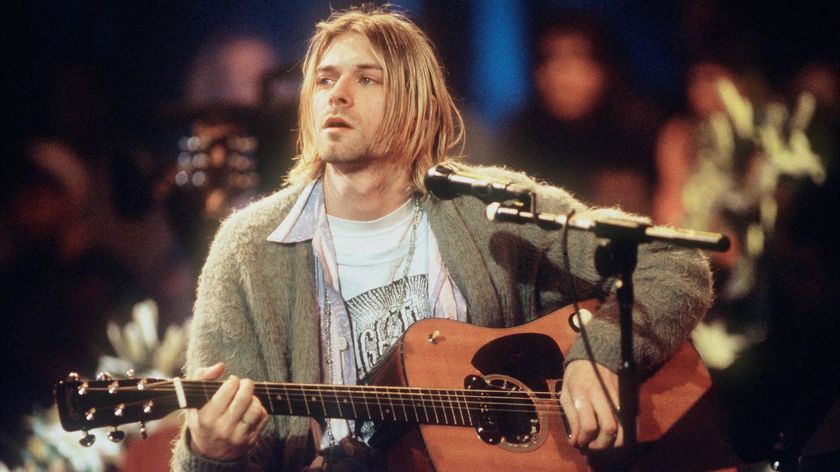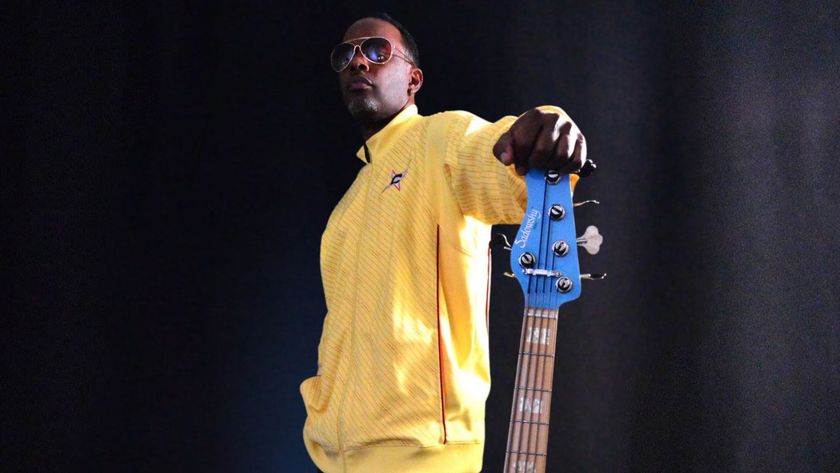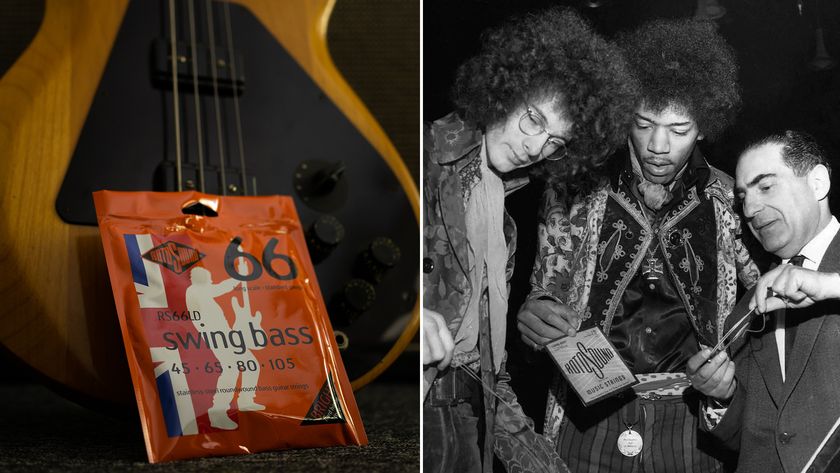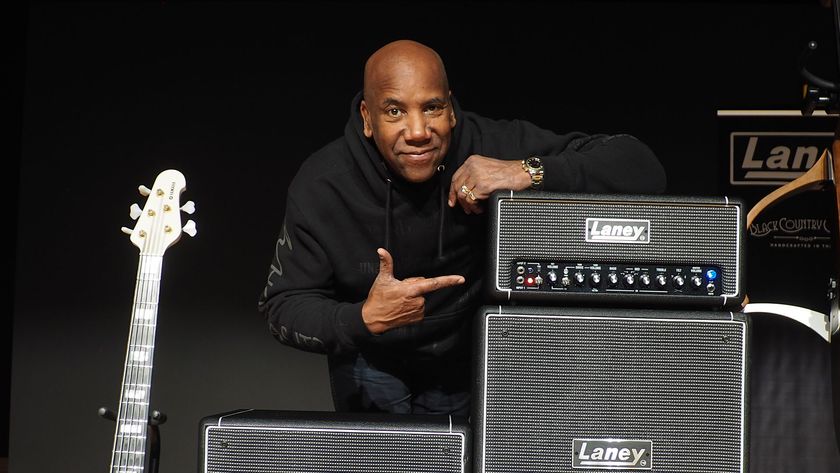Interview: Anders Manga Creates “Evil Hard Rock” with New Project, Bloody Hammers
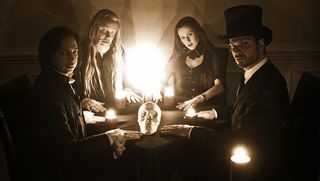
Within hours of releasing the self-titled debut album from his new project, Bloody Hammers, singer Anders Manga was offered a record deal. As a career independent artist, Manga was well established and successful on his own terms but decided to take the plunge with SoulSeller, determining that they were the right company at the right time.
Bloody Hammers is loud, heavy and musically reminiscent of classic 1970s rock. Lyrically and sonically, the album weaves in elements of psychedelia and hints at European metal as well. Manga recently discussed his new project, the decision to sign a label deal, and the resurgence of what he calls “good, classic, evil hard rock.”
GUITAR WORLD: You have released a new project and already have a record deal with SoulSeller Records in the Netherlands. How did they find you and how did this come about?
They are a really proactive label. The day the master was finished I put it up on Bandcamp.com just to be something that rock fans could perhaps stumble across. The next morning I had an e-mail from SoulSeller Records wanting to do a deal. I was thinking, "Wow, if only the rest of my prior career was that easy!" Over the next two weeks, we worked out a deal and I'm happy to say they will be distributing the album worldwide.
Prior to that, was everything done independently?
Yes, I was never really aggressive at pursuing labels. Earlier in my career, I wanted to learn the business by doing it all myself. It was more fun for me to do it all, from writing to releasing to getting the word out. I’ve learned now that things are so much easier with good teamwork.
Was it all digital distribution?
Get The Pick Newsletter
All the latest guitar news, interviews, lessons, reviews, deals and more, direct to your inbox!
I’ve always done CDs because people still want them, but digital has made things so much easier. People can get your music digitally all over the world without the artist having to worry about having a physical distributor and record deal in foreign territories. I think the most important thing for bands is to make your music as easy to access as possible.
In the past, you’ve mentioned the importance and positive aspects of being independent. Why sign with a label now?
I've made an exception this time because I've learned that with help, I can move much faster, and SoulSeller, although a small label, is very aggressive. On top of that, they are very available. I can send mail to them and get a reply in seconds. There is no waiting two or three days for my question to be answered. That is important to me because I like to know what’s happening and how I can help.
You’re doing a vinyl release with Bloody Hammers. How large a pressing, and was this by personal choice, label decision or requests from the fan base?
Hard rock and metal fans love vinyl and I’m the same way. I don’t feel like I truly own an album unless I have the vinyl. I typically buy digital online, but if I like the album, I will get the vinyl as well. I still go to record shows and feel like a little kid when I find some cool LP that I’ve been looking for. I know I could likely go to eBay and find anything, but it’s just not as fun as going and digging through all the stacks at record shows.
Some of your music is also being rediscovered — "Glamour," from Left of an All-Time Low, was selected for a new episode of The Vampire Diaries on the CW Network. How did this come about? Were you surprised that a television network was familiar with your work?
Yes, the music director said he was a big fan for some time, so that was nice. I was in Prague with no Internet at the time when they were looking for me to clear the track. I saw all the mail coming from multiple people when I got to Berlin and replied “yes” quickly. They were in a big rush to get the scene finished. The first recording of that song was done in 1995, but it was more of a rock song. I re-recorded it in 2006 with all synthesizers for the Left of an All-Time Low album, which is the version they used. I knew the show was big but had no idea how big. Their fans are amazing.
When and how did so-called “occult” rock begin finding its way back into the mainstream, for lack of a better word? Why the resurgence? Any theories?
I just think many people missed the simplicity of good, classic, evil, hard rock. There is so much studio trickery going on these days in mainstream hard rock and heavy metal, and I think some of the fans like the “get back to basics” approach many bands are taking now. It can almost be compared to what Nirvana did in the ’90s when they came out with this raw sound that wasn’t over-produced. Aside from that, I think that melody is a big factor as well. There is nothing wrong with a good guttural growl, but I think some of us prefer to hear a good vocal melody by a good singer, and this new wave of bands are really delivering the goods on that. People like Alia O'Brien from Blood Ceremony, Joakim Nilsson from Graveyard or Rosalie Cunningham from Purson ... wow, there are so many that have the pipes and all the melodic sensibility that the legendary rock singers from the ’70s had. There are excellent bands right now making timeless music. It’s a great time for rock music fans.
The following is hardcore and seems to be mostly based in Europe. Why? Is that changing?
America is catching on for sure. For example, the band Graveyard sold out nearly all their dates on their last headlining tour in the States. Another band, Witchcraft, will start their tour soon here and are expecting good crowds. Lots of underground buzz is happening and it’s certainly gaining ground here.
How has the genre changed?
I’m not sure that it’s officially a genre, but I think many of the bands that fall into this “occult” buzzword are largely traditional musically. It’s continuing the tradition built by the legends who came before, like Black Sabbath, Led Zeppelin, Roky Erickson, Pentagram and others. I can’t speak for all the bands, but for me, I’m not necessarily trying reinvent the wheel with Bloody Hammers. My goal is to just write good, simple songs that I like, and with a little luck, others will as well.
Initially, this project was just you. However, there is a band. Did you track everything yourself or did you track with the other musicians? Who produced? Where did you record?
I played everything and produced it at home in my small studio. It was intended to only be something I would quietly release on Bandcamp or someplace like that, but since signing with SoulSeller I’ve decided to get more serious with it. I have a full band now and we’re preparing to play some shows. It’s exciting!
How challenging is it to find musicians who understand your musical and artistic visions?
It was much harder when I was doing the darkwave stuff. That style of music is way underground. Bloody Hammers is just traditional kick-ass, doom-laden, heavy, melodic, hard rock. There are more people into that, so it was easier to find people.
In addition, you just launched a magazine, Occult Rock. What made this seem like the right time, how often do you publish, and if I read correctly on the website, you’re doing digital and print. Why invest in print in this day and age?
I am doing that quarterly and the response has been amazing. I just wanted to do something to help the bands and the scene. If we keep growing, we may be able to get the cost down and make it more widely available. Right now it is a print-on-demand magazine, meaning that when folks buy the print version, Amazon or Magcloud print it, bind it and ship it to them. It’s more expensive this way, but like I said, it looks like we may grow enough to print it traditionally and get the cost way down.
Are there plans to take the Bloody Hammers project from recording to touring?
I guess it all depends on how the album is received by the public, which so far has been positive. I checked this morning and it looks like we’re already very close to selling out of the first pressing of the album on vinyl, so that is encouraging. I would love nothing more than to go out and play and hope it all works out!
— Alison Richter
Alison Richter interviews artists, producers, engineers and other music industry professionals for print and online publications. Read more of her interviews right here.
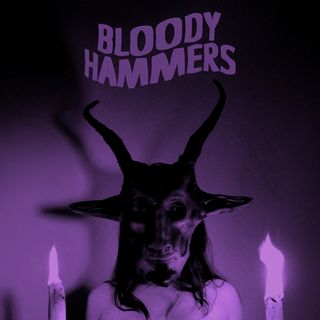
Alison Richter is a seasoned journalist who interviews musicians, producers, engineers, and other industry professionals, and covers mental health issues for GuitarWorld.com. Writing credits include a wide range of publications, including GuitarWorld.com, MusicRadar.com, Bass Player, TNAG Connoisseur, Reverb, Music Industry News, Acoustic, Drummer, Guitar.com, Gearphoria, She Shreds, Guitar Girl, and Collectible Guitar.
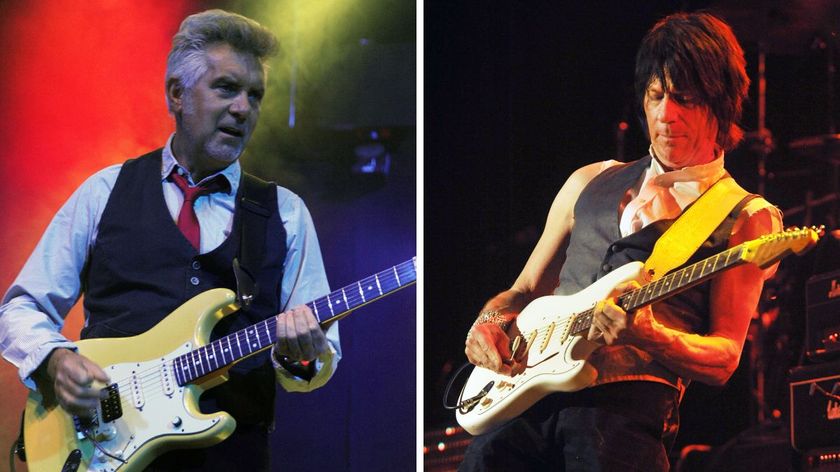
“Jeff was playing through his dodgy Marshall and didn’t like the sound. He said, ‘We’ll do it again, later on…’” Mick Rogers may be in possession of Jeff Beck’s last-ever studio recording

“I could try and recreate his vibrato for the rest of my life. It’s never going to happen. If I got to play his guitar through his rig, it’s not gonna sound like him”: Tony Iommi changed his life – now Scott Ian is playing Sabbath’s last stand
